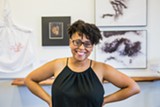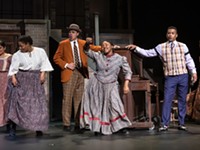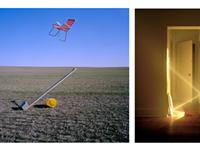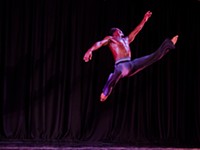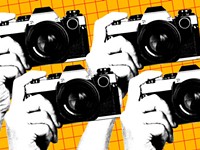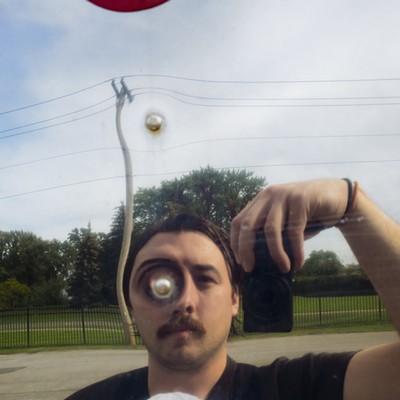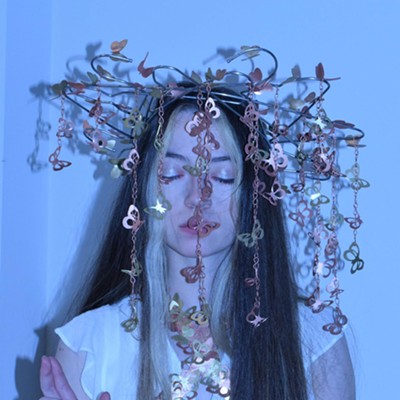'Good Hair' exhibit unravels identity and politics
When locks are loaded
By Rebecca Rafferty @rsrafferty[
{
"name": "500x250 Ad",
"insertPoint": "5",
"component": "15667920",
"parentWrapperClass": "",
"requiredCountToDisplay": "1"
}
]
Although her primary training is in art bookmaking, recent Genesee Center resident artist Amanda Chestnut has branched out to a variety of media to hit her points in her most recent body of work. Her compact show, "Good Hair," includes photographic and letterpress prints, mixed media art books, and other objects, and treads the waters of long-standing social and political conflicts that are ever-frequently shouted about in today's media and online chatter.
Black women's hair is by no means a new subject in art, but Chestnut's approach feels fresh and boldly engages the viewer to consider some ubiquitous concepts regarding race. Last year, Chestnut cut two-thirds of her hair off, which she's used in photographs as well as in two book projects — one for her thesis show at Visual Studies Workshop, and the other at a residency at the Center for Photography at Woodstock last summer.
The experience of cutting her hair was a trial, but not for the reasons you might think. "I went to four different people who refused to cut it," before finding someone who would, she says. The main reason given was that her hair was "fine the way it was" — an educational encounter with the concept of ownership.
This idea of ownership is keenly explored in her minimalist book, "Now you have permission to touch my hair." Through carefully paced phrasing throughout the accordion-folded work, Chestnut unravels and lays bare the balance of possession, desire, and consent, punctuating the piece with a mass of her actual shorn curls adhered inside the back.
Witnessing viewers interact with the book, and her shorn locks, has been a fascinating experience, Chestnut says.
When closed, the hair isn't quite contained within the confines of the tome, both tantalizingly spilling out and giving the impression of something pressed beneath a heavy weight, craving escape.
Chestnut's two large-scale photographs are a different iteration of the images she used in her thesis. Both titled "The Ties that Bind Us," the images are a larger-than-life exploration of bunches of her hair, the masses of tiny ringlets like a universe of dark whorls surrounded by itty bits of clippings on a white surface.
These masses are echoed in her relatively abstract letterpress prints, for which Chestnut hade made a photopolymer plate of her photographs. In the images, the hair becomes almost abstract, with a density of ink that alludes to depth in the centers, and a good level of detail in the curling strands maintained on the edges. They're printed in yellow, magenta, and cyan in two triptychs, one on gold acetate, and the other on silver foil paper.
"I went with the CMYK for those because I was looking at the work of Carrie Mae Weems," she says, referencing the artist's new photobook coming out through Aperture, which includes a series of CMYK images of her kitchen table.
Also hanging on the wall is a white apron, the loaded symbol of a domestic caretaker, with allusions to maternal qualities and servitude. The garment's fabric is gathered in diamond patterns through smocking at the top — a technique she learned from her mother, who handmade her childhood dresses — and the phrase "I am not your intellectual mammy" embroidered in red on the skirt.
The words are drawn from a comment thread that Chestnut spotted online. "For me, as someone who is mixed, who is highly educated, who is an English teacher's daughter with perfect, proper English, I am often seen as a safe person to talk to about things that are hard to talk about, including race," she says.
The particular phrase struck a chord with Chestnut's individual experience as this perceived "safe" person, whose own ideas aren't necessarily heard or even considered by those who don't actually want to learn anything. There is a casually damaging practice, she says, among some who want to be perceived as allies, of finding a person of color to check their own prejudices against, in order to justify them.
"It's really frustrating when people come to me, but get mad when I tell them the truth," she says. "They want me to lay their head on my ample bosom, and pat it gently, and reinforce all the 'truths' that they already 'know.'"
Four button pins rest on a shelf, each printed in low contrast on black with a phrase commonly repeated in media, social media, and conversation: "Why do you have to make everything about race?"; "Silence is compliance"; and "Stay woke." There's a power in the subtlety of the printing — rather than being visually shouted, the viewer has to get close enough to the wearer to read the pin, and that intimacy might engender an actual conversation.
Chestnut has recently been awarded the 2016 Strokosch Fellowship to attend the Alliance of Artists Communities annual conference, which takes place in Portland, Oregon in October.
Speaking of...
Latest in Art
More by Rebecca Rafferty
-
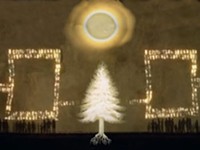
Beyond folklore
Apr 4, 2024 -

Partnership perks: Public Provisions @ Flour City Bread
Feb 24, 2024 -
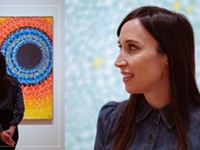
Raison d’Art
Feb 19, 2024 - More »
